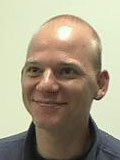Erik Meijer, Creator, LINQ

Erik Meijer is an architect in the Microsoft SQL server division where he currently works together with the Microsoft Visual C# and the Microsoft Visual Basic language design teams on data integration in programming languages.
Prior to joining Microsoft he was an associate professor at Utrecht University and adjunct professor at the Oregon Graduate Institute.
Erik is one of the designers of the standard functional programming language Haskell98 and more recently the Cw language.





